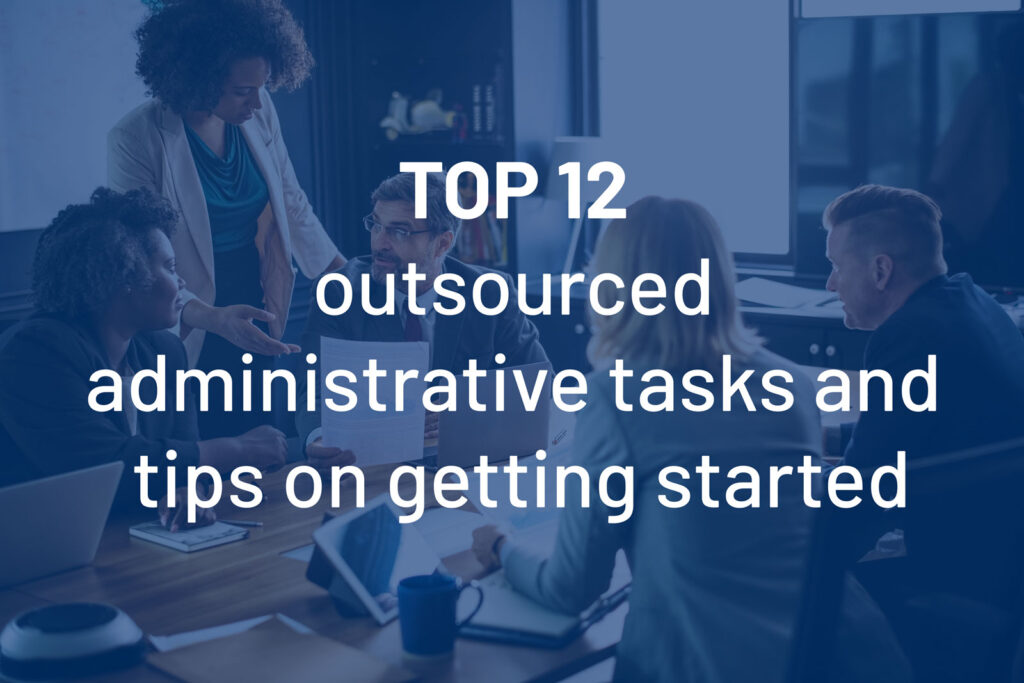Outsourcing administrative tasks has become increasingly popular for businesses looking to streamline operations and improve efficiency.
Here are the top 12 most commonly outsourced administrative tasks and tips on getting started
1. Data entry: Outsourcing data entry tasks can free up valuable time and resources, allowing businesses to focus on core activities.
2. Bookkeeping and accounting: Outsourcing these tasks ensures accurate financial records and compliance with regulations, while also providing cost savings compared to hiring an in-house accounting team.
3. Customer service and help desk support: Outsourcing customer service can enhance overall customer satisfaction and retention, as it ensures round-the-clock support and expertise.
1. Data entry: Outsourcing data entry tasks can free up valuable time and resources, allowing businesses to focus on core activities.
2. Bookkeeping and accounting: Outsourcing these tasks ensures accurate financial records and compliance with regulations, while also providing cost savings compared to hiring an in-house accounting team.
3. Customer service and help desk support: Outsourcing customer service can enhance overall customer satisfaction and retention, as it ensures round-the-clock support and expertise.
4. Appointment scheduling: Outsourcing this task can help businesses manage their time effectively, ensuring that appointments are organized and clients are promptly attended to.
5. Social media management: Outsourcing social media management can help businesses maintain a strong online presence, engage with their audience, and implement effective marketing strategies.
6. Email management: Outsourcing email management ensures that important messages are promptly addressed, freeing up employees to focus on other critical tasks.
7. Travel arrangements and booking: Outsourcing travel arrangements can save businesses time and money, as well as provide access to expert travel planning services.
8. Transcription services: Outsourcing transcription tasks can ensure accurate and timely conversion of audio or video content into written form.
9. Human resources support: Outsourcing HR tasks can ensure compliance with employment laws, improved employee relations, and access to HR expertise.
10. IT support and help desk services: Outsourcing IT support ensures efficient resolution of technical issues, reducing downtime and maintaining business continuity.
11. Billing and invoicing: Outsourcing these tasks can streamline payment processes, improve cash flow, and reduce billing errors.
12. Document management and organization: Outsourcing document management can ensure that important files and records are properly organized and maintained.
The impact of outsourcing these tasks on businesses is significant. It allows them to focus on their core competencies, reduce operational costs, access specialized skills and expertise, and improve flexibility and scalability.
Busy businesses cannot afford to disregard these tasks, no matter how minute, as they are integral to maintaining operational efficiency and delivering quality service to customers.
It is important to highlight how outsourcing enables companies to stay competitive in a rapidly changing market by allowing them to allocate their resources effectively.
Additionally, outsourcing allows businesses to access global talent pools, leading to increased innovation and productivity.
Still not quite sure how to get started?
Here are some tips:
1. Identify the tasks to outsource: Start by identifying the administrative tasks that consume significant time and resources within your organization. This may include data entry, bookkeeping, customer service, and more.
2. Research potential service providers: Look for reputable outsourcing companies that specialize in the tasks you want to outsource. Consider factors such as expertise, experience, client reviews, and cost when evaluating potential providers.
3. Define your requirements: Clearly outline the scope of work, expectations, and deliverables for the tasks you plan to outsource. Setting clear guidelines will help ensure that the outsourcing arrangement meets your needs.
4. Establish communication channels: Effective communication is crucial when working with outsourcing partners. Define communication channels and frequency to stay updated on the progress of outsourced tasks.
5. Consider data security: If you’ll be sharing sensitive information with outsourcing partners, ensure that they have robust data security measures in place to protect your confidential data.
6. Start with a trial project: Consider starting with a small, low-risk project to assess the capabilities and performance of a potential outsourcing partner before committing to a long-term arrangement.
7. Monitor performance: Regularly monitor the performance of your outsourcing partner to ensure that they meet quality standards and deadlines. Address any issues promptly to maintain a smooth working relationship.
8. Build a strong contract: Work to establish a comprehensive contract that outlines the terms of the outsourcing arrangement, including deliverables, timelines, payment terms, and dispute resolution procedures.
It’s important to approach outsourcing with careful planning and consideration to maximize its potential benefits.
If you have any specific questions or need further assistance with outsourcing, feel free to ask!


